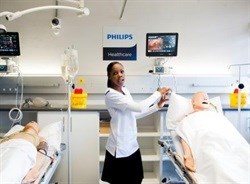
Top stories






More news


Marketing & Media
Ads are coming to AI. Does that really have to be such a bad thing?














This pioneering project will contribute to the hands-on training of medical students in South Africa by providing accurate simulations in imitated medical emergency settings. Philips has equipped the simulation lab at UJ with medical equipment and diagnostic devices intended to facilitate the exposure of emergency care students and academic staff to current medical technologies and adequately prepare them to operate under a pressurised and intense work environment.
"It is important that students have a fully incorporated curriculum with simulation as a key component of teaching and assessment. Up until recently, staff and students made use of classrooms that were not purposefully designed for simulation-based learning. We started to explore ideas around creating an integrated, multi-disciplinary laboratory that would focus on teaching and assessment of clinical skills in a simulation environment. As a company focused on innovations in the healthcare sector, Philips has proved to be the ideal partner to bring this simulation laboratory concept to life," says Dr Craig Lambert, Head of the Department of Emergency Medical Care at UJ.
The South African Department of Higher Education and Training has also played a key role in this project by awarding a clinical training grant to assist UJ in improving the clinical competencies of health professional graduates, and getting the simulation lab up and running.
The lab is divided into four wards: an ambulance simulation room, an emergency department representing casualty simulation, a general ward and ICU. University departments of Emergency Medical Care, Biomedical Technology, Nursing and Radiology will benefit from the training at the new simulation lab.
Appropriate implementation training (on a 'train the trainer' basis) will be provided by Philips, as this training is central to the success and sustainability of the lab. Philips will also provide training to the academic employees and clinicians on the correct and most effective use of all the new technologies and products which they have installed in the simulation laboratories.
Peter van de Ven, Vice President: Philips Healthcare Africa, says, "Through our ongoing partnership with one of the most respected universities in South Africa, Philips is contributing much needed resources to ensure that there is a highly trained and qualified healthcare workforce for the public to rely on. We are helping to transform healthcare in South Africa by enhancing the individual performance of the next generation of healthcare professionals, which will ultimately benefit the patients in the form of good, reliable care".
The partnership between Philips and UJ (established during Philips' Cape Town to Cairo roadshow in 2013) will run over a three-year period and will support research opportunities related to new technologies in the emergency care environment. These learnings will contribute to Philips' investments in healthcare research and development.
Professor Andre Swart, Executive Dean of the Faculty of Health Sciences at the University of Johannesburg concludes, "Philips is a company known for its commitment to enhancing healthcare across Africa and uplifting healthcare in the educational space. The partnership between Philips and UJ is a mutually beneficial opportunity; for UJ to expose our students to new technologies and for Philips to introduce their latest innovations into the African healthcare environment. We look forward to a long and sustainable partnership dedicated to training a solid and reliable medical workforce for South Africa to depend on."
Johannesburg is the penultimate stop on Philips' annual flagship Cairo to Cape Town roadshow, (from 14 April to 4 September 2014) which focuses on key challenges facing Africa today - the need for energy-efficient lighting and the revitalisation of African healthcare infrastructure. In contribution to the post-2015 development agenda, Philips calls for improving universal access to healthcare and reducing the double-disease burden of communicable and non-communicable diseases (NCDs) as additions to the current millennium development goals.
The roadshow has made its way across seven countries and ten cities in Africa, and will conclude in Cape Town on 4 September 2014.
For more information, please follow the Cairo to Cape Town roadshow on: http://www.philips.com/africaroadshow